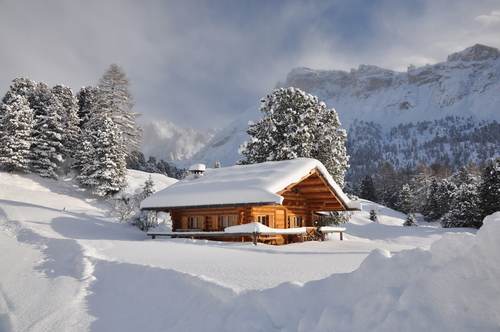Whether it is your summer vacation cottage, or your recently vacated home put up for sale, proper winterizing prevents your home from deteriorating while it’s empty and saves you money both now and later.
Make a list
Decide what needs to be done and make a list to check off as you do it. Be sure to add these areas to your list.
- Plumbing: Turn off water at the exterior of your home. Make sure the lines completely drain by turning on all the taps until no more water comes out. Water remaining in the lines can freeze, causing your pipes to burst and resulting in very expensive repairs both to the pipes and to floor coverings and walls. Blow water from pipes using an air compressor. Pour RV-type anti-freeze in the traps. Close sink and tub drains to keep out critters and preventing odors. Cover the toilet bowl with plastic wrap to prevent sewer gasses from entering your home.
- Appliances: Drain water from your dishwasher, washing machine and your refrigerator’s water lines. Remove your refrigerator’s water filter so that it does not freeze and break inside the refrigerator. Drain and turn off your water heater. If your power will be off, completely empty and clean your refrigerator, then prop the door open to prevent mold growth.
- Utilities: If your home has power during the winter, set your thermostat low, but warm enough to prevent freezing and to keep your home dry so that mold does not grow. Also, unplug all appliances, including televisions and microwaves to prevent risk of fire from faulty wires.
- Pests: Remember that mice and rats like warm places. They also like to gnaw on wires. If your home is prone to pests when it is empty, set out bait or traps, or consult a pest control professional. Remove any foods stored in boxes or bags, since pests can chew through the cardboard or plastic to get at the stale crackers or cereal inside.
- Remove any liquids that might freeze. This includes bottled water, soda or beer in cans or bottles, and even paint.
- Close flues and dampers, windows and vents. Seal any opening that might invite pests or the cold into your home.
- Closing shutters or drapes will keep the sun from fading your carpet and protect your windows from inclement weather such as hail.
- Wash linens and store them in plastic bags. The vacuum-sealed storage bags repel water, dirt and insects and protect your sheets, towels and blankets from mildew and mold.
If your home is for sale
When your vacant home is for sale, it is smart to leave the power on. If the home uses gas for heating, then be sure to leave the gas on as well. Buyers want to see the home, so if it is too cold or too dark, your home is less likely to sell. Check with us about managing your empty property.
Compliments of Virtual Results


